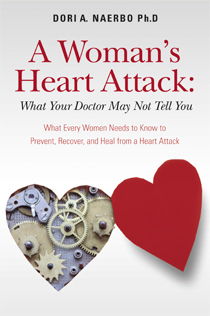There are numerous studies that link depression and heart disease more strongly in women than in men. Anxiety also is linked to women who have suffered heart attacks. Anxiety is a normal reaction to a stressor. Women’s worries and anxieties may show up in the body through physical symptoms like back pain, sleeplessness, or stomach discomfort. However, for people who have had a heart attack, anxiety can affect us by manifesting as chest pain and subsequent heart attacks, as well as in the kinds of body/mind/spirit depression described in my book.
Anxiety related to heart attacks can manifest in various ways:
♥ Physical effects: heart palpitations, tachycardia (rapid heartbeat), muscle weakness, tension, fatigue, nausea, chest pain, shortness of breath, stomachaches, or headaches.
♥ Cognitive effects: fear of dying, especially when pain exists.
♥ Emotional effects: feelings of dread, trouble concentrating, tension, irritability, restlessness, or feeling scared.
♥ Behavioral effects: becoming withdrawn, changes in sleep patterns, and nervous habits.
The symptoms related to anxiety are so numerous that it’s easy to mistake heart attack symptoms for anxiety symptoms. Just to see how complicated it can be to align the symptoms with the right cause, let’s look at what type of anxiety is associated with the chest.
Anxiety symptoms commonly associated with the chest area:
♥ Chest pain or discomfort
♥ Concern about the heart
♥ Feeling like you have to force yourself to breathe
♥ Finding it hard to breathe, feeling smothered, and/or shortness of breath
♥ Heart palpitations where the heart beats too hard or too fast
♥ Irregular heart rhythms, fluttering or “skipped” beats, a tickle in the chest that leads to coughing
♥ Pounding heart or heart feeling as if it’s beating too hard
♥ Rib or rib cage tightness, pressure, or feeling of a tight band around the rib cage
Clearly, there are many similarities between these anxiety symptoms and those of a heart attack, which is discussed in Chapter Four of my book, these similar symptoms help to explain why so often women’s heart attacks are misdiagnosed as simply a case of anxiety.
Depression and anxiety are two separate disorders, and it’s possible to have one without the other or to have both. In the Nurses’ Health Study from 1992 to 2004, scientists followed 63,000 women. The twelve-year study concluded that depressed women were more than twice as likely to experience sudden cardiac death caused by an irregular heartbeat. Additionally, depressed women were 40% more likely to die from heart disease compared to women without depression, according to Whang et al. (2009).
If you have any of these symptoms, please go and get checked out. It is easy to think that it will go over but sometimes it doesn’t and you begin to think, oh I will just lay down and give it a few more minutes and then the minutes run into hours. Asking for help is a sign of advocating for yourself, not a sign of weakness.
Perhaps someone you know has been misdiagnosed with anxiety or depression only to suffer a heart attack, or you had anxiety or depression followed by a heart attack, we want you to share your story. It is important for woman to understand this connection. Please feel free to comment and share your knowledge. What did you get out of the article? Did you find this article useful. Let us know we want to hear from you.
Copyright © 2012 DoriNaerbo.com. All rights reserved.







Speak Your Mind